Comparative Analysis: Globalization and Education in Three Nations
VerifiedAdded on 2023/03/23
|14
|3784
|67
Essay
AI Summary
This essay examines the multifaceted impact of globalization on education systems, particularly in developing nations. It uses a comparative approach, focusing on case studies from India, Bhutan, and England, to illustrate the complexities and nuances of this relationship. The essay explores how neo-liberal education policies have influenced developing countries, the role of English as a global language, and the importance of preserving native languages. It also delves into the impact of globalization on curriculum development, teaching methods, and educational reforms, highlighting the tensions between global standards and local contexts. The analysis considers the influence of international organizations and the challenges of balancing national identity with global competitiveness. Ultimately, the essay provides a comprehensive overview of the ways in which globalization is reshaping education systems worldwide.

Running head: GLOBALIZATION AND EDUCATION
GLOBALIZATION AND EDUCATION
Name of the Student:
Name of the University:
Author note:
GLOBALIZATION AND EDUCATION
Name of the Student:
Name of the University:
Author note:
Paraphrase This Document
Need a fresh take? Get an instant paraphrase of this document with our AI Paraphraser
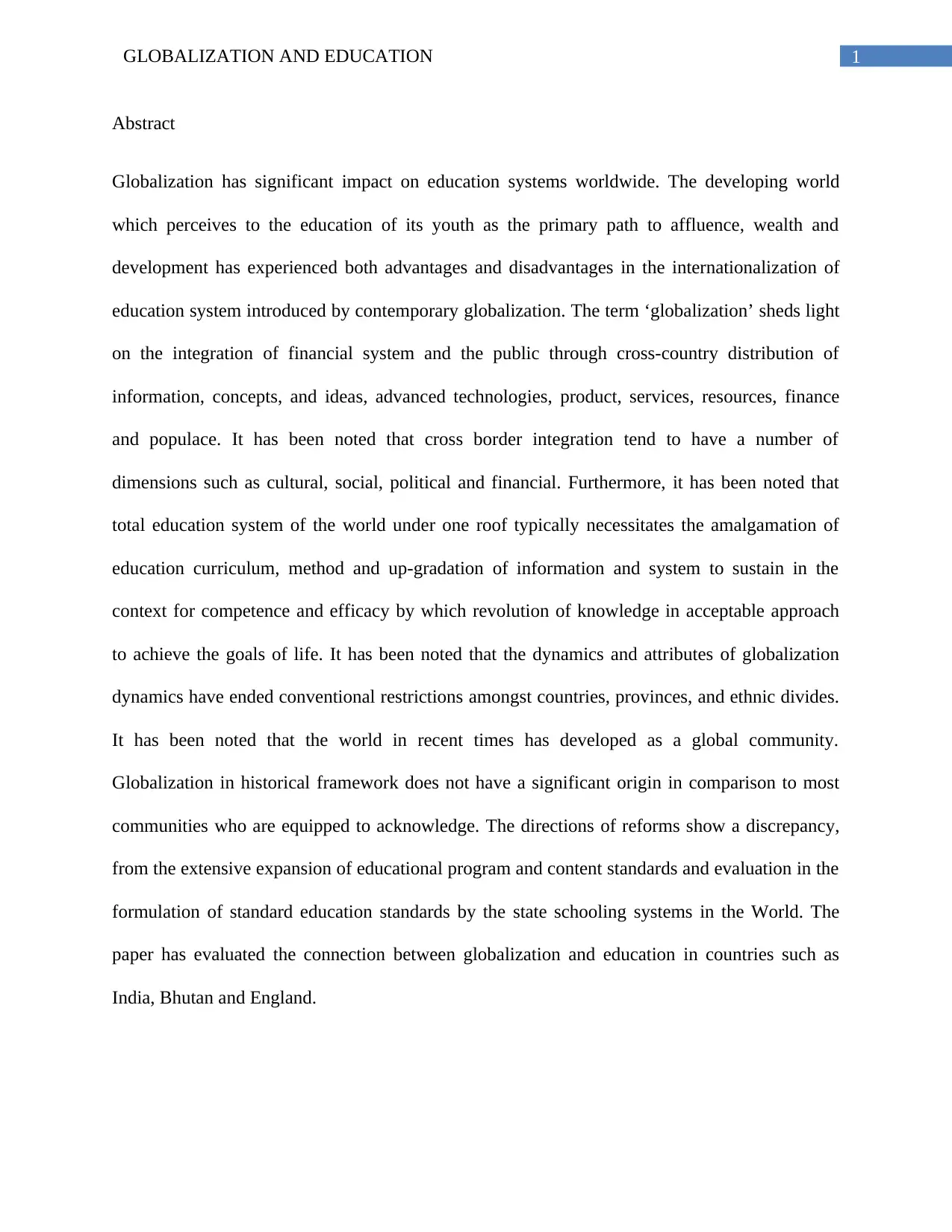
1GLOBALIZATION AND EDUCATION
Abstract
Globalization has significant impact on education systems worldwide. The developing world
which perceives to the education of its youth as the primary path to affluence, wealth and
development has experienced both advantages and disadvantages in the internationalization of
education system introduced by contemporary globalization. The term ‘globalization’ sheds light
on the integration of financial system and the public through cross-country distribution of
information, concepts, and ideas, advanced technologies, product, services, resources, finance
and populace. It has been noted that cross border integration tend to have a number of
dimensions such as cultural, social, political and financial. Furthermore, it has been noted that
total education system of the world under one roof typically necessitates the amalgamation of
education curriculum, method and up-gradation of information and system to sustain in the
context for competence and efficacy by which revolution of knowledge in acceptable approach
to achieve the goals of life. It has been noted that the dynamics and attributes of globalization
dynamics have ended conventional restrictions amongst countries, provinces, and ethnic divides.
It has been noted that the world in recent times has developed as a global community.
Globalization in historical framework does not have a significant origin in comparison to most
communities who are equipped to acknowledge. The directions of reforms show a discrepancy,
from the extensive expansion of educational program and content standards and evaluation in the
formulation of standard education standards by the state schooling systems in the World. The
paper has evaluated the connection between globalization and education in countries such as
India, Bhutan and England.
Abstract
Globalization has significant impact on education systems worldwide. The developing world
which perceives to the education of its youth as the primary path to affluence, wealth and
development has experienced both advantages and disadvantages in the internationalization of
education system introduced by contemporary globalization. The term ‘globalization’ sheds light
on the integration of financial system and the public through cross-country distribution of
information, concepts, and ideas, advanced technologies, product, services, resources, finance
and populace. It has been noted that cross border integration tend to have a number of
dimensions such as cultural, social, political and financial. Furthermore, it has been noted that
total education system of the world under one roof typically necessitates the amalgamation of
education curriculum, method and up-gradation of information and system to sustain in the
context for competence and efficacy by which revolution of knowledge in acceptable approach
to achieve the goals of life. It has been noted that the dynamics and attributes of globalization
dynamics have ended conventional restrictions amongst countries, provinces, and ethnic divides.
It has been noted that the world in recent times has developed as a global community.
Globalization in historical framework does not have a significant origin in comparison to most
communities who are equipped to acknowledge. The directions of reforms show a discrepancy,
from the extensive expansion of educational program and content standards and evaluation in the
formulation of standard education standards by the state schooling systems in the World. The
paper has evaluated the connection between globalization and education in countries such as
India, Bhutan and England.
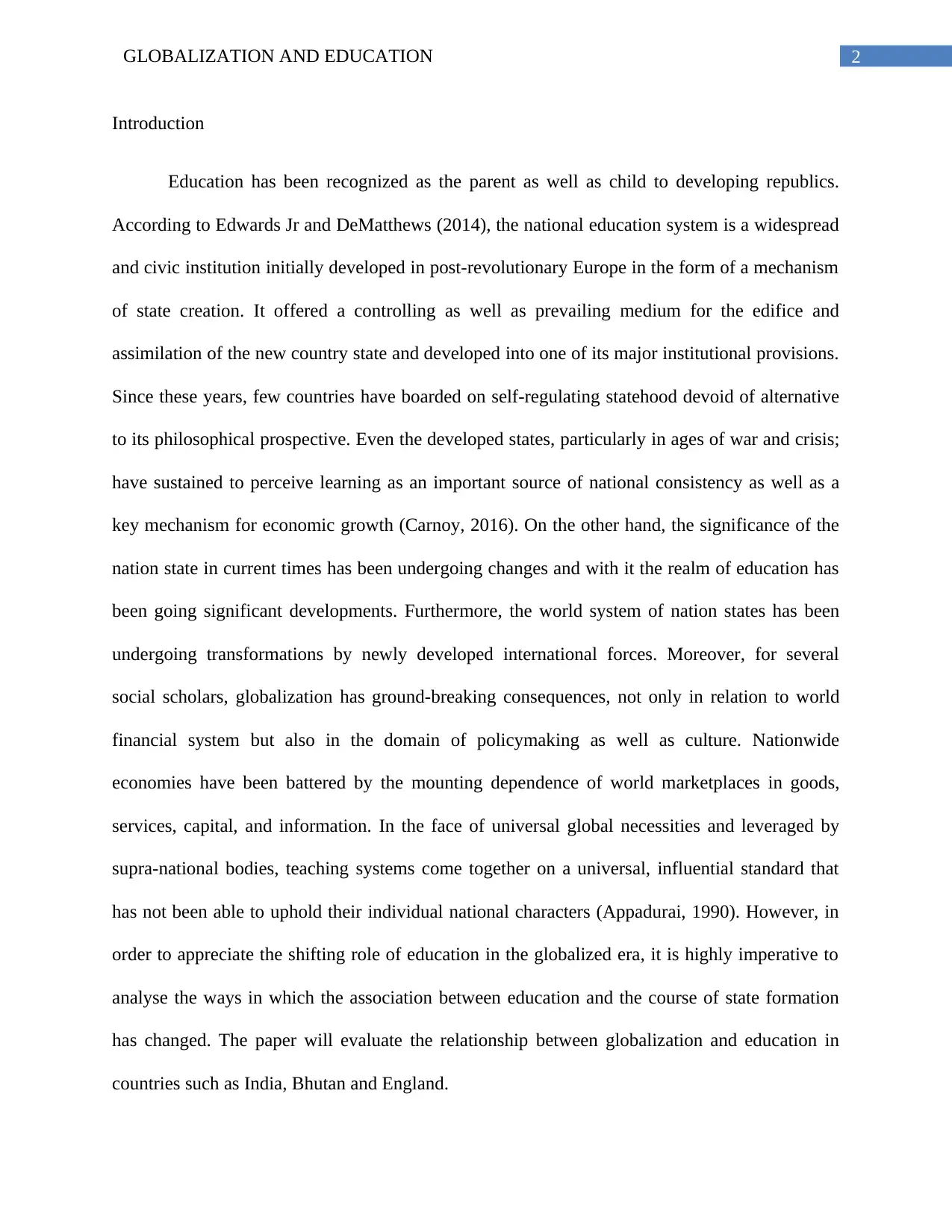
2GLOBALIZATION AND EDUCATION
Introduction
Education has been recognized as the parent as well as child to developing republics.
According to Edwards Jr and DeMatthews (2014), the national education system is a widespread
and civic institution initially developed in post-revolutionary Europe in the form of a mechanism
of state creation. It offered a controlling as well as prevailing medium for the edifice and
assimilation of the new country state and developed into one of its major institutional provisions.
Since these years, few countries have boarded on self-regulating statehood devoid of alternative
to its philosophical prospective. Even the developed states, particularly in ages of war and crisis;
have sustained to perceive learning as an important source of national consistency as well as a
key mechanism for economic growth (Carnoy, 2016). On the other hand, the significance of the
nation state in current times has been undergoing changes and with it the realm of education has
been going significant developments. Furthermore, the world system of nation states has been
undergoing transformations by newly developed international forces. Moreover, for several
social scholars, globalization has ground-breaking consequences, not only in relation to world
financial system but also in the domain of policymaking as well as culture. Nationwide
economies have been battered by the mounting dependence of world marketplaces in goods,
services, capital, and information. In the face of universal global necessities and leveraged by
supra-national bodies, teaching systems come together on a universal, influential standard that
has not been able to uphold their individual national characters (Appadurai, 1990). However, in
order to appreciate the shifting role of education in the globalized era, it is highly imperative to
analyse the ways in which the association between education and the course of state formation
has changed. The paper will evaluate the relationship between globalization and education in
countries such as India, Bhutan and England.
Introduction
Education has been recognized as the parent as well as child to developing republics.
According to Edwards Jr and DeMatthews (2014), the national education system is a widespread
and civic institution initially developed in post-revolutionary Europe in the form of a mechanism
of state creation. It offered a controlling as well as prevailing medium for the edifice and
assimilation of the new country state and developed into one of its major institutional provisions.
Since these years, few countries have boarded on self-regulating statehood devoid of alternative
to its philosophical prospective. Even the developed states, particularly in ages of war and crisis;
have sustained to perceive learning as an important source of national consistency as well as a
key mechanism for economic growth (Carnoy, 2016). On the other hand, the significance of the
nation state in current times has been undergoing changes and with it the realm of education has
been going significant developments. Furthermore, the world system of nation states has been
undergoing transformations by newly developed international forces. Moreover, for several
social scholars, globalization has ground-breaking consequences, not only in relation to world
financial system but also in the domain of policymaking as well as culture. Nationwide
economies have been battered by the mounting dependence of world marketplaces in goods,
services, capital, and information. In the face of universal global necessities and leveraged by
supra-national bodies, teaching systems come together on a universal, influential standard that
has not been able to uphold their individual national characters (Appadurai, 1990). However, in
order to appreciate the shifting role of education in the globalized era, it is highly imperative to
analyse the ways in which the association between education and the course of state formation
has changed. The paper will evaluate the relationship between globalization and education in
countries such as India, Bhutan and England.
⊘ This is a preview!⊘
Do you want full access?
Subscribe today to unlock all pages.

Trusted by 1+ million students worldwide
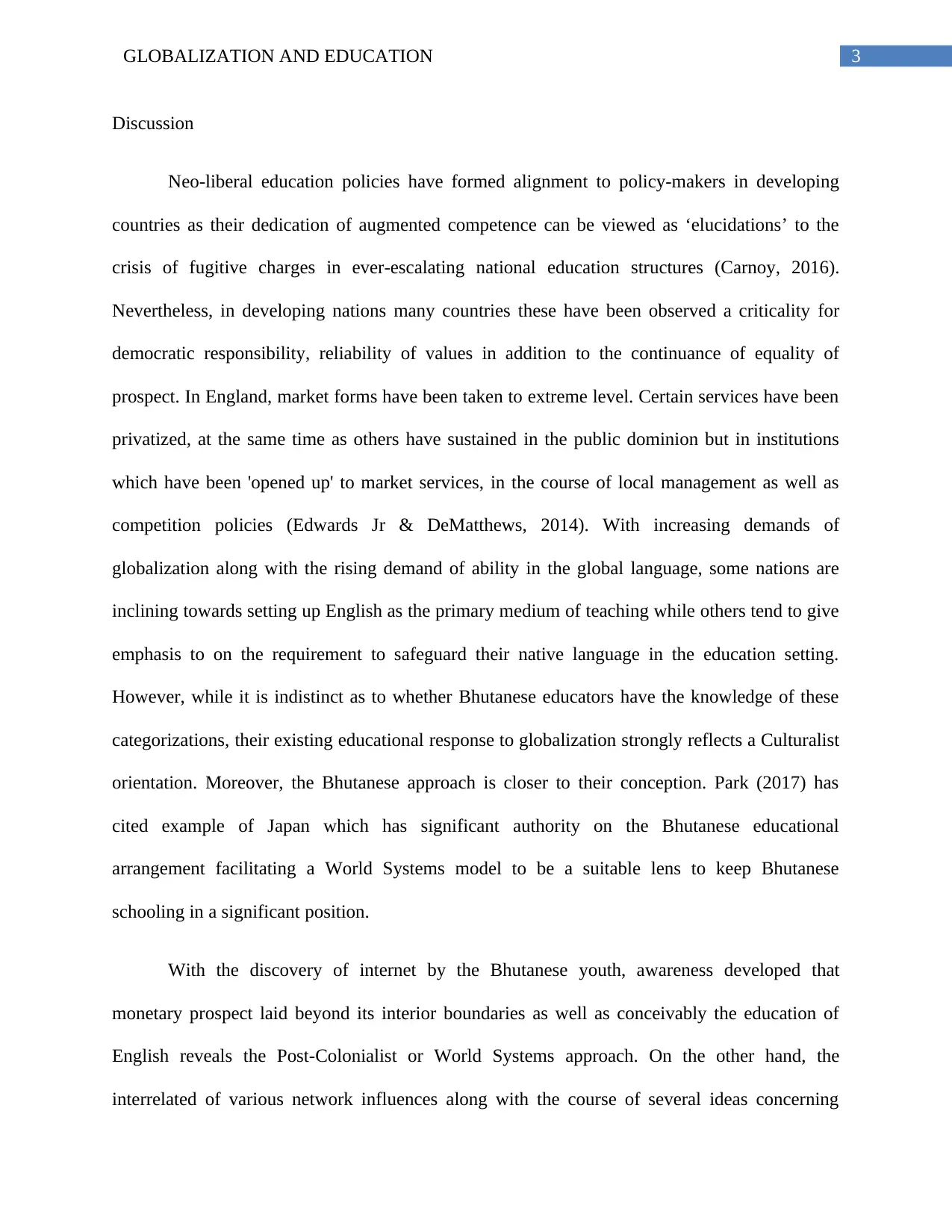
3GLOBALIZATION AND EDUCATION
Discussion
Neo-liberal education policies have formed alignment to policy-makers in developing
countries as their dedication of augmented competence can be viewed as ‘elucidations’ to the
crisis of fugitive charges in ever-escalating national education structures (Carnoy, 2016).
Nevertheless, in developing nations many countries these have been observed a criticality for
democratic responsibility, reliability of values in addition to the continuance of equality of
prospect. In England, market forms have been taken to extreme level. Certain services have been
privatized, at the same time as others have sustained in the public dominion but in institutions
which have been 'opened up' to market services, in the course of local management as well as
competition policies (Edwards Jr & DeMatthews, 2014). With increasing demands of
globalization along with the rising demand of ability in the global language, some nations are
inclining towards setting up English as the primary medium of teaching while others tend to give
emphasis to on the requirement to safeguard their native language in the education setting.
However, while it is indistinct as to whether Bhutanese educators have the knowledge of these
categorizations, their existing educational response to globalization strongly reflects a Culturalist
orientation. Moreover, the Bhutanese approach is closer to their conception. Park (2017) has
cited example of Japan which has significant authority on the Bhutanese educational
arrangement facilitating a World Systems model to be a suitable lens to keep Bhutanese
schooling in a significant position.
With the discovery of internet by the Bhutanese youth, awareness developed that
monetary prospect laid beyond its interior boundaries as well as conceivably the education of
English reveals the Post-Colonialist or World Systems approach. On the other hand, the
interrelated of various network influences along with the course of several ideas concerning
Discussion
Neo-liberal education policies have formed alignment to policy-makers in developing
countries as their dedication of augmented competence can be viewed as ‘elucidations’ to the
crisis of fugitive charges in ever-escalating national education structures (Carnoy, 2016).
Nevertheless, in developing nations many countries these have been observed a criticality for
democratic responsibility, reliability of values in addition to the continuance of equality of
prospect. In England, market forms have been taken to extreme level. Certain services have been
privatized, at the same time as others have sustained in the public dominion but in institutions
which have been 'opened up' to market services, in the course of local management as well as
competition policies (Edwards Jr & DeMatthews, 2014). With increasing demands of
globalization along with the rising demand of ability in the global language, some nations are
inclining towards setting up English as the primary medium of teaching while others tend to give
emphasis to on the requirement to safeguard their native language in the education setting.
However, while it is indistinct as to whether Bhutanese educators have the knowledge of these
categorizations, their existing educational response to globalization strongly reflects a Culturalist
orientation. Moreover, the Bhutanese approach is closer to their conception. Park (2017) has
cited example of Japan which has significant authority on the Bhutanese educational
arrangement facilitating a World Systems model to be a suitable lens to keep Bhutanese
schooling in a significant position.
With the discovery of internet by the Bhutanese youth, awareness developed that
monetary prospect laid beyond its interior boundaries as well as conceivably the education of
English reveals the Post-Colonialist or World Systems approach. On the other hand, the
interrelated of various network influences along with the course of several ideas concerning
Paraphrase This Document
Need a fresh take? Get an instant paraphrase of this document with our AI Paraphraser
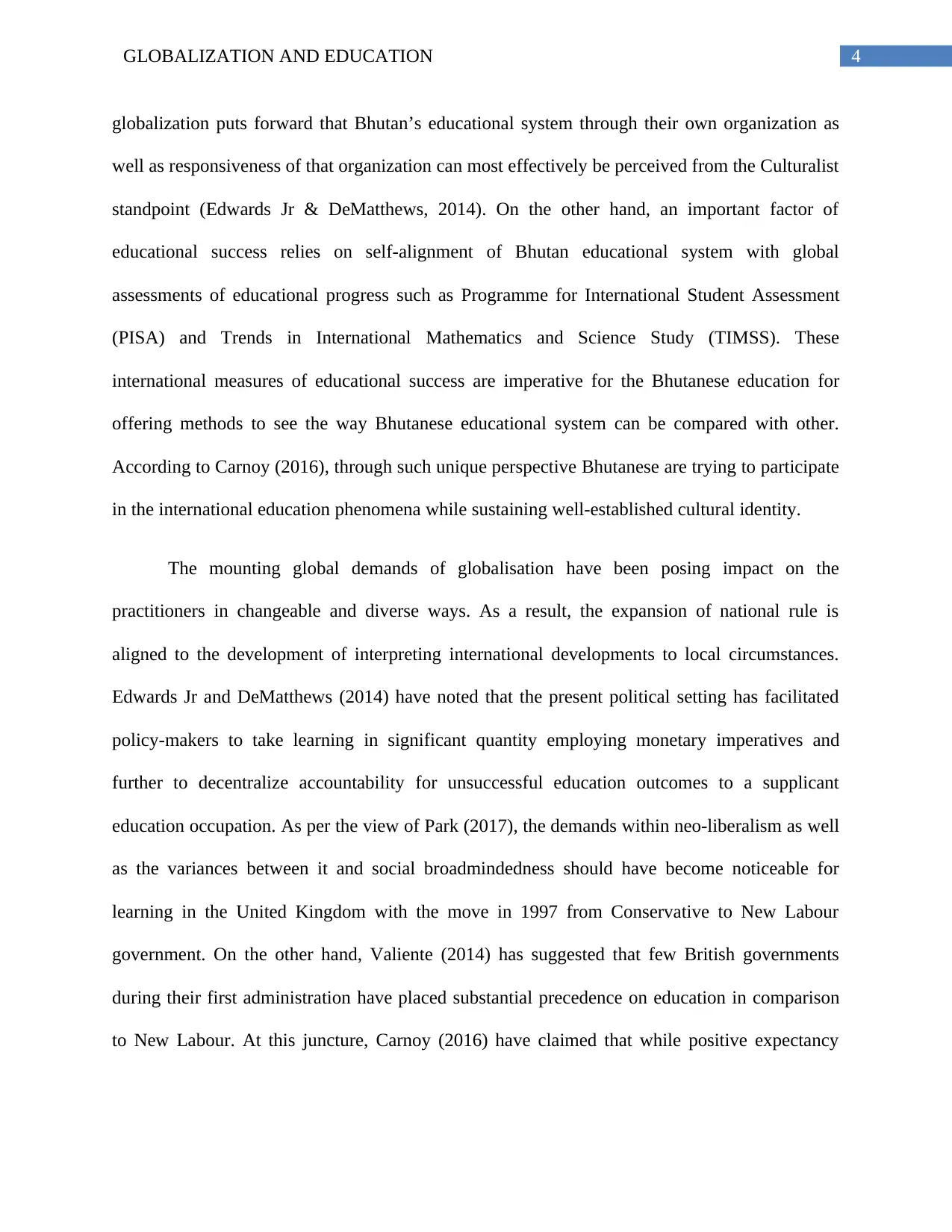
4GLOBALIZATION AND EDUCATION
globalization puts forward that Bhutan’s educational system through their own organization as
well as responsiveness of that organization can most effectively be perceived from the Culturalist
standpoint (Edwards Jr & DeMatthews, 2014). On the other hand, an important factor of
educational success relies on self-alignment of Bhutan educational system with global
assessments of educational progress such as Programme for International Student Assessment
(PISA) and Trends in International Mathematics and Science Study (TIMSS). These
international measures of educational success are imperative for the Bhutanese education for
offering methods to see the way Bhutanese educational system can be compared with other.
According to Carnoy (2016), through such unique perspective Bhutanese are trying to participate
in the international education phenomena while sustaining well-established cultural identity.
The mounting global demands of globalisation have been posing impact on the
practitioners in changeable and diverse ways. As a result, the expansion of national rule is
aligned to the development of interpreting international developments to local circumstances.
Edwards Jr and DeMatthews (2014) have noted that the present political setting has facilitated
policy-makers to take learning in significant quantity employing monetary imperatives and
further to decentralize accountability for unsuccessful education outcomes to a supplicant
education occupation. As per the view of Park (2017), the demands within neo-liberalism as well
as the variances between it and social broadmindedness should have become noticeable for
learning in the United Kingdom with the move in 1997 from Conservative to New Labour
government. On the other hand, Valiente (2014) has suggested that few British governments
during their first administration have placed substantial precedence on education in comparison
to New Labour. At this juncture, Carnoy (2016) have claimed that while positive expectancy
globalization puts forward that Bhutan’s educational system through their own organization as
well as responsiveness of that organization can most effectively be perceived from the Culturalist
standpoint (Edwards Jr & DeMatthews, 2014). On the other hand, an important factor of
educational success relies on self-alignment of Bhutan educational system with global
assessments of educational progress such as Programme for International Student Assessment
(PISA) and Trends in International Mathematics and Science Study (TIMSS). These
international measures of educational success are imperative for the Bhutanese education for
offering methods to see the way Bhutanese educational system can be compared with other.
According to Carnoy (2016), through such unique perspective Bhutanese are trying to participate
in the international education phenomena while sustaining well-established cultural identity.
The mounting global demands of globalisation have been posing impact on the
practitioners in changeable and diverse ways. As a result, the expansion of national rule is
aligned to the development of interpreting international developments to local circumstances.
Edwards Jr and DeMatthews (2014) have noted that the present political setting has facilitated
policy-makers to take learning in significant quantity employing monetary imperatives and
further to decentralize accountability for unsuccessful education outcomes to a supplicant
education occupation. As per the view of Park (2017), the demands within neo-liberalism as well
as the variances between it and social broadmindedness should have become noticeable for
learning in the United Kingdom with the move in 1997 from Conservative to New Labour
government. On the other hand, Valiente (2014) has suggested that few British governments
during their first administration have placed substantial precedence on education in comparison
to New Labour. At this juncture, Carnoy (2016) have claimed that while positive expectancy

5GLOBALIZATION AND EDUCATION
successfully expanded as the authority of the private sector as well as choice as per competence
had been pessimistically endorsed.
The amalgamation of diverse nationwide educational reforms in the United Kingdom and
the impacts of international neo-liberal supremacy by prevailing economic agencies have set up
an educational policy in institutions, characterized by a need for liability, entrepreneurism and
dimension. Comprehensive studies of Guttal (2007) have noted that the UK government’s
favoured transformational model of educational management has been predominantly shaped as
per the micro-response to the mounting demands of globalization. Meanwhile, Valiente (2014)
has noted that some scholars perceive learning as a ‘third estate’ amid the liberated sector and the
‘autocratic indicator of regulation’. The major accountability of the ‘third estate’ has developed
greater accountability than democracy, as educational systems tend to intercede between families
and the organizations of the nation and its financial system. In the UK, as majority educational
agencies are recognized as public institutions, they tend to develop semi-autonomous nature.
Furthermore, educational agencies have been perceived as places where democracy, liberal
citizenship along with scholarship gathers knowledge from each other. In educational agencies
with considerable conceptualization of globalization, global trends are recognized as an external
event as well as a embodiment for competitiveness. At this peak of discussion, Edwards Jr and
DeMatthews (2014) have suggested that the sense of professional affiliation which tends to
function in England before the occurrence of globalisation has not been regarded as the gift of
government, viewed as an outcome of critical ‘educational politics’. Thus, as per the studies of
Valiente (2014) there is a potential possibility such criticality of education politics is due to the
nonappearance of contestation rather than the demands of globalisation. Moreover, super-
technocrats engaged in international organisations such as, the EU and OECD however are not
successfully expanded as the authority of the private sector as well as choice as per competence
had been pessimistically endorsed.
The amalgamation of diverse nationwide educational reforms in the United Kingdom and
the impacts of international neo-liberal supremacy by prevailing economic agencies have set up
an educational policy in institutions, characterized by a need for liability, entrepreneurism and
dimension. Comprehensive studies of Guttal (2007) have noted that the UK government’s
favoured transformational model of educational management has been predominantly shaped as
per the micro-response to the mounting demands of globalization. Meanwhile, Valiente (2014)
has noted that some scholars perceive learning as a ‘third estate’ amid the liberated sector and the
‘autocratic indicator of regulation’. The major accountability of the ‘third estate’ has developed
greater accountability than democracy, as educational systems tend to intercede between families
and the organizations of the nation and its financial system. In the UK, as majority educational
agencies are recognized as public institutions, they tend to develop semi-autonomous nature.
Furthermore, educational agencies have been perceived as places where democracy, liberal
citizenship along with scholarship gathers knowledge from each other. In educational agencies
with considerable conceptualization of globalization, global trends are recognized as an external
event as well as a embodiment for competitiveness. At this peak of discussion, Edwards Jr and
DeMatthews (2014) have suggested that the sense of professional affiliation which tends to
function in England before the occurrence of globalisation has not been regarded as the gift of
government, viewed as an outcome of critical ‘educational politics’. Thus, as per the studies of
Valiente (2014) there is a potential possibility such criticality of education politics is due to the
nonappearance of contestation rather than the demands of globalisation. Moreover, super-
technocrats engaged in international organisations such as, the EU and OECD however are not
⊘ This is a preview!⊘
Do you want full access?
Subscribe today to unlock all pages.

Trusted by 1+ million students worldwide

6GLOBALIZATION AND EDUCATION
starting modifications as per the educational reform but have been reacting to altering
circumstances. Likewise, in Bhutan, Carnoy (2016) have noted that there are several discourses
and conversations that are important to the nation. Studies of Park (2017) have revealed that
demands of globalization have aided educators in Bhutan to obtain significant awareness of the
social identities that can be formed by means of international global social relations.
The patterns of the teaching profession in Bhutan are recognized as one of the major
global influences in addition to nationalisation of the head of educational institutions in
reforming Bhutanese education. These relations with global education systems have stimulated
the creation of reinforced Bhutanese social identity for the chief of educational agencies and the
educators in addition to education for all (Fenwick, Edwards & Sawchuk, 2015). These
educational policy notions have been principally transnational in nature as this tends to reflect a
comprehensive message concerning education which draws evidence in other contexts. To
understand globalization impact on Bhutan educational system scholars have tried to link its
underlying factors through intertextuality tool. Intertextuality takes place in all education system
contexts. It is regarded as a phenomenon which aided education systems chooses the best
practices which have shaped education systems. Park (2017) has claimed that in Bhutan
education system right through all the education policy documents, the curriculum has been
viewed as one of the important pillars of quality education. The curriculum as a result has been
repeatedly evaluated as well as reformed in order to provide an education that is evocative and
supportive of education of learners. Edwards Jr and DeMatthews (2014) have shed light on three
recognized curriculum reforms namely reintroduction of Shakespeare into the Class XI-XII
program of study, compulsory passing in Dzongkha, recognized as the national language of
Bhutan in addition to the introduction of the first performance festival designed for 10th standard
starting modifications as per the educational reform but have been reacting to altering
circumstances. Likewise, in Bhutan, Carnoy (2016) have noted that there are several discourses
and conversations that are important to the nation. Studies of Park (2017) have revealed that
demands of globalization have aided educators in Bhutan to obtain significant awareness of the
social identities that can be formed by means of international global social relations.
The patterns of the teaching profession in Bhutan are recognized as one of the major
global influences in addition to nationalisation of the head of educational institutions in
reforming Bhutanese education. These relations with global education systems have stimulated
the creation of reinforced Bhutanese social identity for the chief of educational agencies and the
educators in addition to education for all (Fenwick, Edwards & Sawchuk, 2015). These
educational policy notions have been principally transnational in nature as this tends to reflect a
comprehensive message concerning education which draws evidence in other contexts. To
understand globalization impact on Bhutan educational system scholars have tried to link its
underlying factors through intertextuality tool. Intertextuality takes place in all education system
contexts. It is regarded as a phenomenon which aided education systems chooses the best
practices which have shaped education systems. Park (2017) has claimed that in Bhutan
education system right through all the education policy documents, the curriculum has been
viewed as one of the important pillars of quality education. The curriculum as a result has been
repeatedly evaluated as well as reformed in order to provide an education that is evocative and
supportive of education of learners. Edwards Jr and DeMatthews (2014) have shed light on three
recognized curriculum reforms namely reintroduction of Shakespeare into the Class XI-XII
program of study, compulsory passing in Dzongkha, recognized as the national language of
Bhutan in addition to the introduction of the first performance festival designed for 10th standard
Paraphrase This Document
Need a fresh take? Get an instant paraphrase of this document with our AI Paraphraser
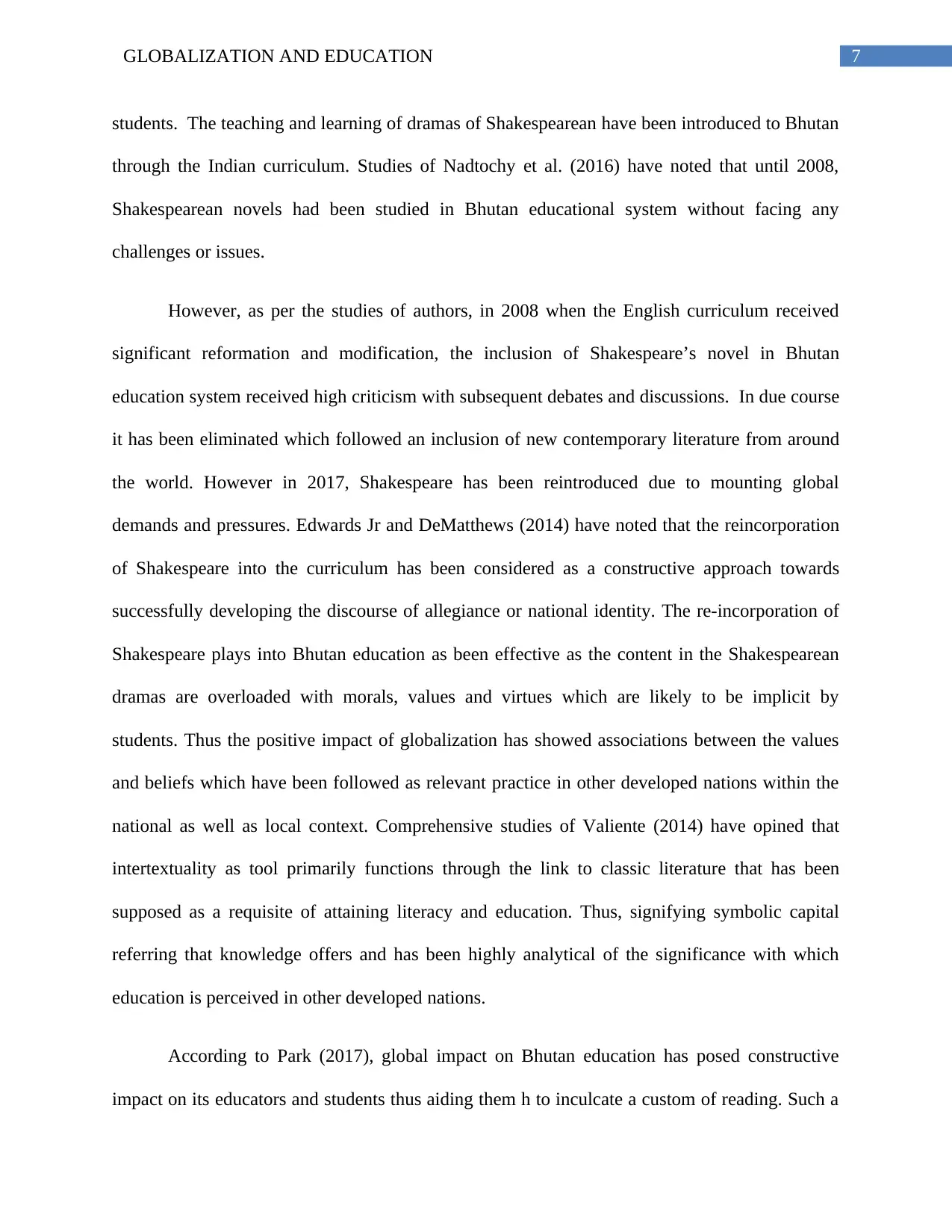
7GLOBALIZATION AND EDUCATION
students. The teaching and learning of dramas of Shakespearean have been introduced to Bhutan
through the Indian curriculum. Studies of Nadtochy et al. (2016) have noted that until 2008,
Shakespearean novels had been studied in Bhutan educational system without facing any
challenges or issues.
However, as per the studies of authors, in 2008 when the English curriculum received
significant reformation and modification, the inclusion of Shakespeare’s novel in Bhutan
education system received high criticism with subsequent debates and discussions. In due course
it has been eliminated which followed an inclusion of new contemporary literature from around
the world. However in 2017, Shakespeare has been reintroduced due to mounting global
demands and pressures. Edwards Jr and DeMatthews (2014) have noted that the reincorporation
of Shakespeare into the curriculum has been considered as a constructive approach towards
successfully developing the discourse of allegiance or national identity. The re-incorporation of
Shakespeare plays into Bhutan education as been effective as the content in the Shakespearean
dramas are overloaded with morals, values and virtues which are likely to be implicit by
students. Thus the positive impact of globalization has showed associations between the values
and beliefs which have been followed as relevant practice in other developed nations within the
national as well as local context. Comprehensive studies of Valiente (2014) have opined that
intertextuality as tool primarily functions through the link to classic literature that has been
supposed as a requisite of attaining literacy and education. Thus, signifying symbolic capital
referring that knowledge offers and has been highly analytical of the significance with which
education is perceived in other developed nations.
According to Park (2017), global impact on Bhutan education has posed constructive
impact on its educators and students thus aiding them h to inculcate a custom of reading. Such a
students. The teaching and learning of dramas of Shakespearean have been introduced to Bhutan
through the Indian curriculum. Studies of Nadtochy et al. (2016) have noted that until 2008,
Shakespearean novels had been studied in Bhutan educational system without facing any
challenges or issues.
However, as per the studies of authors, in 2008 when the English curriculum received
significant reformation and modification, the inclusion of Shakespeare’s novel in Bhutan
education system received high criticism with subsequent debates and discussions. In due course
it has been eliminated which followed an inclusion of new contemporary literature from around
the world. However in 2017, Shakespeare has been reintroduced due to mounting global
demands and pressures. Edwards Jr and DeMatthews (2014) have noted that the reincorporation
of Shakespeare into the curriculum has been considered as a constructive approach towards
successfully developing the discourse of allegiance or national identity. The re-incorporation of
Shakespeare plays into Bhutan education as been effective as the content in the Shakespearean
dramas are overloaded with morals, values and virtues which are likely to be implicit by
students. Thus the positive impact of globalization has showed associations between the values
and beliefs which have been followed as relevant practice in other developed nations within the
national as well as local context. Comprehensive studies of Valiente (2014) have opined that
intertextuality as tool primarily functions through the link to classic literature that has been
supposed as a requisite of attaining literacy and education. Thus, signifying symbolic capital
referring that knowledge offers and has been highly analytical of the significance with which
education is perceived in other developed nations.
According to Park (2017), global impact on Bhutan education has posed constructive
impact on its educators and students thus aiding them h to inculcate a custom of reading. Such a

8GLOBALIZATION AND EDUCATION
reading as per the view of authors tends to offer significant access to texts and literature both in
Dzongkha as well as English language further enhancing their individual as well as intellectual
growth. On the contrary, Carnoy (2016) have claimed that in Bhutan the economic aspect of
globalisation reflects a thriving significance in the education sector. According to Fenwick,
Edwards and Sawchuk (2015), neoliberal agendas not only separately operated in order to reform
national education policies by employing such discourse. It primarily casted light on the
neoliberal thought of privatisation which has further aided developing nations like Bhutan and
India to have access to educational policies from developed nations. Furthermore, several private
educational institutions in Bhutan have been supported by global organisation in order to become
equipped in Bhutan.
On the contrary, while India another developing nation has opened its door to the foreign
contributors in its educational domain, the nation has encountered significant challenges. These
challenges have primarily emerged from the mounting demands of globalization and pressures of
liberalization. However, accounting the optimistic contribution of the globalisation in India
through broaden prospects and avenues, the development of information technology has
improved the connection between economic expansion and higher education. Such development
has led highly experienced and educated individuals to develop as vital pillars in economic
growth. Edwards Jr and DeMatthews (2014) have noted that similar to other sectors, there tends
to be a major scale between the industrial as well as education sector along with a well-
established association for the sustainability of the education and employment system. Moreover,
in the recent span, education reform policies of India have shed substantial importance to the
value of higher education. On the other hand, Park (2017) has claimed that commercial private
higher education tends to expand from market forces align to monetary economic and global
reading as per the view of authors tends to offer significant access to texts and literature both in
Dzongkha as well as English language further enhancing their individual as well as intellectual
growth. On the contrary, Carnoy (2016) have claimed that in Bhutan the economic aspect of
globalisation reflects a thriving significance in the education sector. According to Fenwick,
Edwards and Sawchuk (2015), neoliberal agendas not only separately operated in order to reform
national education policies by employing such discourse. It primarily casted light on the
neoliberal thought of privatisation which has further aided developing nations like Bhutan and
India to have access to educational policies from developed nations. Furthermore, several private
educational institutions in Bhutan have been supported by global organisation in order to become
equipped in Bhutan.
On the contrary, while India another developing nation has opened its door to the foreign
contributors in its educational domain, the nation has encountered significant challenges. These
challenges have primarily emerged from the mounting demands of globalization and pressures of
liberalization. However, accounting the optimistic contribution of the globalisation in India
through broaden prospects and avenues, the development of information technology has
improved the connection between economic expansion and higher education. Such development
has led highly experienced and educated individuals to develop as vital pillars in economic
growth. Edwards Jr and DeMatthews (2014) have noted that similar to other sectors, there tends
to be a major scale between the industrial as well as education sector along with a well-
established association for the sustainability of the education and employment system. Moreover,
in the recent span, education reform policies of India have shed substantial importance to the
value of higher education. On the other hand, Park (2017) has claimed that commercial private
higher education tends to expand from market forces align to monetary economic and global
⊘ This is a preview!⊘
Do you want full access?
Subscribe today to unlock all pages.

Trusted by 1+ million students worldwide

9GLOBALIZATION AND EDUCATION
forces. Essentially, private institutions are determined by the principles of commercialism which
emphasize on vocational courses as well as extremely practical curriculum.
Research conducted by Valiente (2014) has noted that in the U.S interest for productivity
and revenues have been categorically significant among private higher education providers.
While, in developing nations like India, it is only profit which essentially thrives these
educational institutions thus resulting to a jeopardized effectiveness. One of the most prominent
ways in which global benchmarking has leveraged educational perspective of the United States is
through the idea of elevated universal standards. However, reports of authors have revealed that
the report ‘Benchmarking for Success: Ensuring U.S. Students Receive a World-Class
Education’ in the year 2008 has claimed that not only the United States have been losing its
string significant edge in teaching sector, but the destabilized students’ performance along with
significant gaps between the students’ education achievement from diverse socioeconomic
groups have been severely impacting economically as well as socially (Ascd.org, 2019). Thus,
emerging education reform recommended that America must pursue superior performing nations
and improve its educational level by embracing a universal core of globally benchmarked values
and standards in math and language arts starting from pre-primary to higher grades. Such an
improved educational reform has been followed in order to ensure strong efficiency and
productivity of students with essential knowledge and skills to attain global competitiveness.
There has been considerable progress in educational agencies of the U.S over the past five years.
According to Carnoy (2016), the mounting awareness of the threats regarding climate change has
formed public support for changes in curriculum. Some states have performed ecological or
sustainability initiatives. On the other hand, other nations have been contributing to
environmental literacy to science as well as social studies standards (Carnoy, 2016). Moreover,
forces. Essentially, private institutions are determined by the principles of commercialism which
emphasize on vocational courses as well as extremely practical curriculum.
Research conducted by Valiente (2014) has noted that in the U.S interest for productivity
and revenues have been categorically significant among private higher education providers.
While, in developing nations like India, it is only profit which essentially thrives these
educational institutions thus resulting to a jeopardized effectiveness. One of the most prominent
ways in which global benchmarking has leveraged educational perspective of the United States is
through the idea of elevated universal standards. However, reports of authors have revealed that
the report ‘Benchmarking for Success: Ensuring U.S. Students Receive a World-Class
Education’ in the year 2008 has claimed that not only the United States have been losing its
string significant edge in teaching sector, but the destabilized students’ performance along with
significant gaps between the students’ education achievement from diverse socioeconomic
groups have been severely impacting economically as well as socially (Ascd.org, 2019). Thus,
emerging education reform recommended that America must pursue superior performing nations
and improve its educational level by embracing a universal core of globally benchmarked values
and standards in math and language arts starting from pre-primary to higher grades. Such an
improved educational reform has been followed in order to ensure strong efficiency and
productivity of students with essential knowledge and skills to attain global competitiveness.
There has been considerable progress in educational agencies of the U.S over the past five years.
According to Carnoy (2016), the mounting awareness of the threats regarding climate change has
formed public support for changes in curriculum. Some states have performed ecological or
sustainability initiatives. On the other hand, other nations have been contributing to
environmental literacy to science as well as social studies standards (Carnoy, 2016). Moreover,
Paraphrase This Document
Need a fresh take? Get an instant paraphrase of this document with our AI Paraphraser
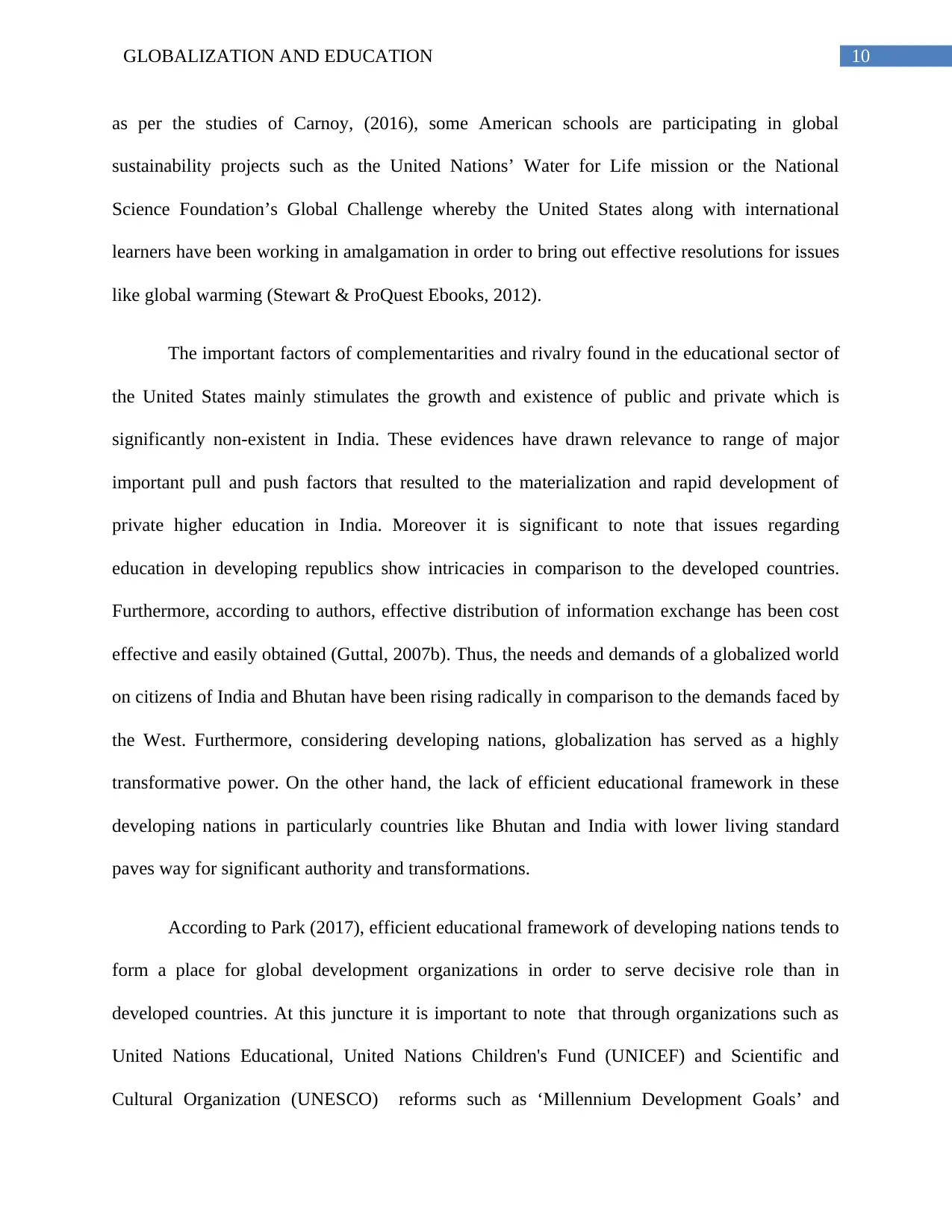
10GLOBALIZATION AND EDUCATION
as per the studies of Carnoy, (2016), some American schools are participating in global
sustainability projects such as the United Nations’ Water for Life mission or the National
Science Foundation’s Global Challenge whereby the United States along with international
learners have been working in amalgamation in order to bring out effective resolutions for issues
like global warming (Stewart & ProQuest Ebooks, 2012).
The important factors of complementarities and rivalry found in the educational sector of
the United States mainly stimulates the growth and existence of public and private which is
significantly non-existent in India. These evidences have drawn relevance to range of major
important pull and push factors that resulted to the materialization and rapid development of
private higher education in India. Moreover it is significant to note that issues regarding
education in developing republics show intricacies in comparison to the developed countries.
Furthermore, according to authors, effective distribution of information exchange has been cost
effective and easily obtained (Guttal, 2007b). Thus, the needs and demands of a globalized world
on citizens of India and Bhutan have been rising radically in comparison to the demands faced by
the West. Furthermore, considering developing nations, globalization has served as a highly
transformative power. On the other hand, the lack of efficient educational framework in these
developing nations in particularly countries like Bhutan and India with lower living standard
paves way for significant authority and transformations.
According to Park (2017), efficient educational framework of developing nations tends to
form a place for global development organizations in order to serve decisive role than in
developed countries. At this juncture it is important to note that through organizations such as
United Nations Educational, United Nations Children's Fund (UNICEF) and Scientific and
Cultural Organization (UNESCO) reforms such as ‘Millennium Development Goals’ and
as per the studies of Carnoy, (2016), some American schools are participating in global
sustainability projects such as the United Nations’ Water for Life mission or the National
Science Foundation’s Global Challenge whereby the United States along with international
learners have been working in amalgamation in order to bring out effective resolutions for issues
like global warming (Stewart & ProQuest Ebooks, 2012).
The important factors of complementarities and rivalry found in the educational sector of
the United States mainly stimulates the growth and existence of public and private which is
significantly non-existent in India. These evidences have drawn relevance to range of major
important pull and push factors that resulted to the materialization and rapid development of
private higher education in India. Moreover it is significant to note that issues regarding
education in developing republics show intricacies in comparison to the developed countries.
Furthermore, according to authors, effective distribution of information exchange has been cost
effective and easily obtained (Guttal, 2007b). Thus, the needs and demands of a globalized world
on citizens of India and Bhutan have been rising radically in comparison to the demands faced by
the West. Furthermore, considering developing nations, globalization has served as a highly
transformative power. On the other hand, the lack of efficient educational framework in these
developing nations in particularly countries like Bhutan and India with lower living standard
paves way for significant authority and transformations.
According to Park (2017), efficient educational framework of developing nations tends to
form a place for global development organizations in order to serve decisive role than in
developed countries. At this juncture it is important to note that through organizations such as
United Nations Educational, United Nations Children's Fund (UNICEF) and Scientific and
Cultural Organization (UNESCO) reforms such as ‘Millennium Development Goals’ and
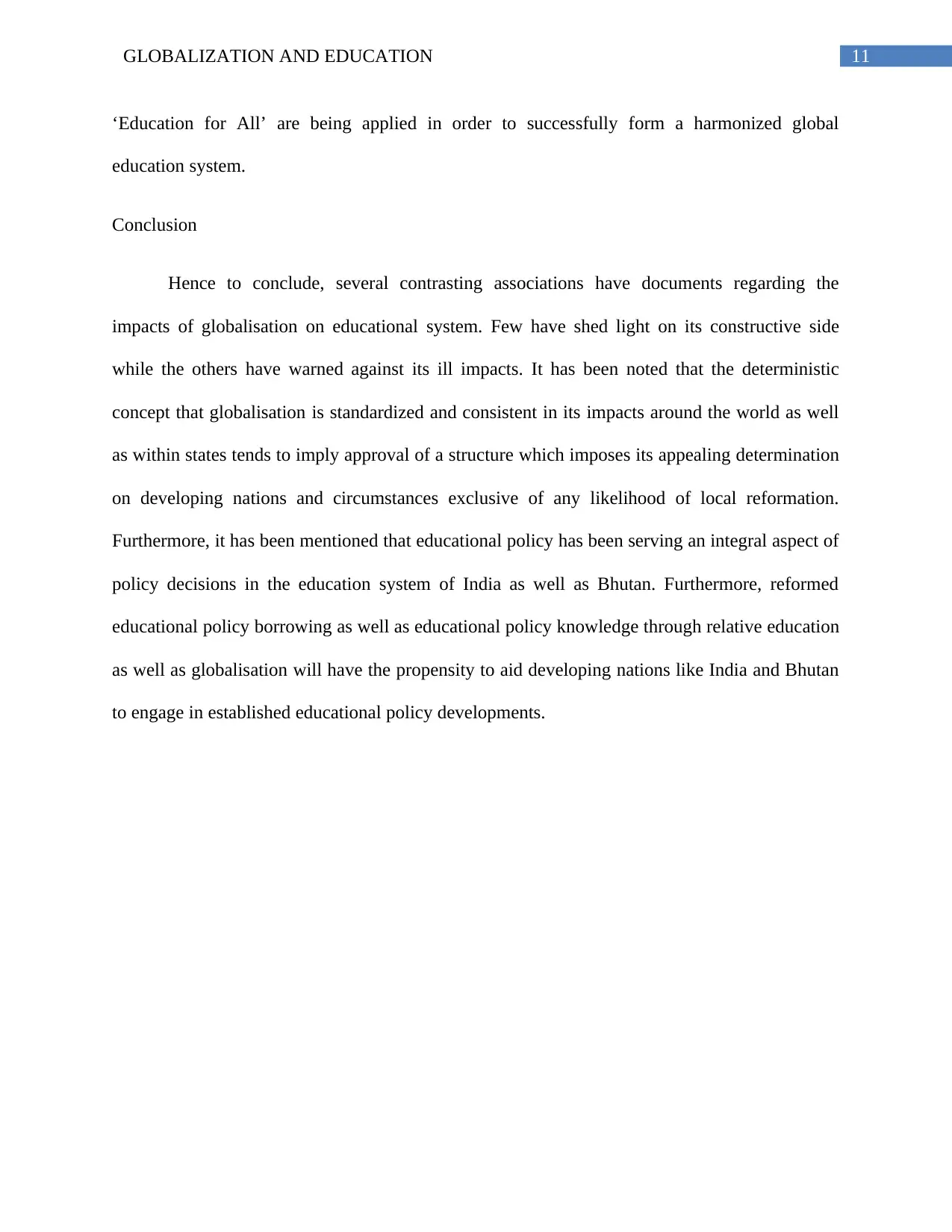
11GLOBALIZATION AND EDUCATION
‘Education for All’ are being applied in order to successfully form a harmonized global
education system.
Conclusion
Hence to conclude, several contrasting associations have documents regarding the
impacts of globalisation on educational system. Few have shed light on its constructive side
while the others have warned against its ill impacts. It has been noted that the deterministic
concept that globalisation is standardized and consistent in its impacts around the world as well
as within states tends to imply approval of a structure which imposes its appealing determination
on developing nations and circumstances exclusive of any likelihood of local reformation.
Furthermore, it has been mentioned that educational policy has been serving an integral aspect of
policy decisions in the education system of India as well as Bhutan. Furthermore, reformed
educational policy borrowing as well as educational policy knowledge through relative education
as well as globalisation will have the propensity to aid developing nations like India and Bhutan
to engage in established educational policy developments.
‘Education for All’ are being applied in order to successfully form a harmonized global
education system.
Conclusion
Hence to conclude, several contrasting associations have documents regarding the
impacts of globalisation on educational system. Few have shed light on its constructive side
while the others have warned against its ill impacts. It has been noted that the deterministic
concept that globalisation is standardized and consistent in its impacts around the world as well
as within states tends to imply approval of a structure which imposes its appealing determination
on developing nations and circumstances exclusive of any likelihood of local reformation.
Furthermore, it has been mentioned that educational policy has been serving an integral aspect of
policy decisions in the education system of India as well as Bhutan. Furthermore, reformed
educational policy borrowing as well as educational policy knowledge through relative education
as well as globalisation will have the propensity to aid developing nations like India and Bhutan
to engage in established educational policy developments.
⊘ This is a preview!⊘
Do you want full access?
Subscribe today to unlock all pages.

Trusted by 1+ million students worldwide
1 out of 14
Related Documents
Your All-in-One AI-Powered Toolkit for Academic Success.
+13062052269
info@desklib.com
Available 24*7 on WhatsApp / Email
![[object Object]](/_next/static/media/star-bottom.7253800d.svg)
Unlock your academic potential
Copyright © 2020–2025 A2Z Services. All Rights Reserved. Developed and managed by ZUCOL.





